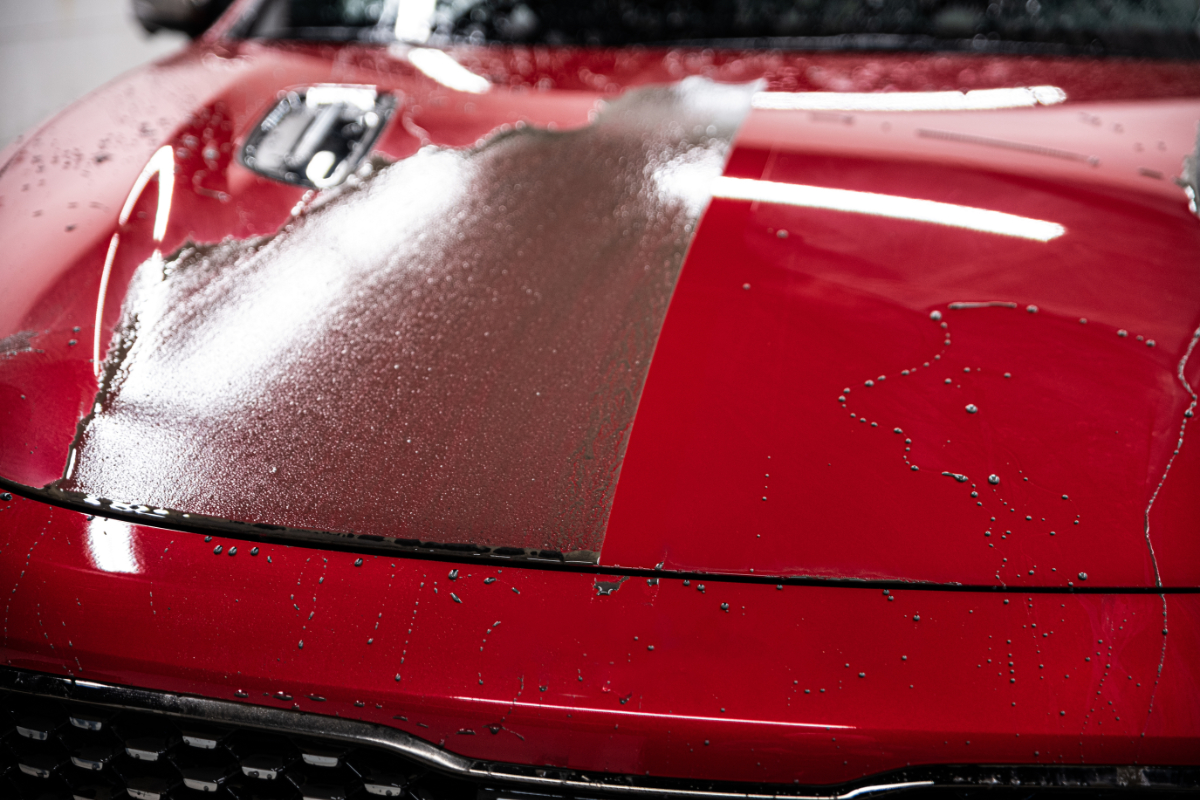A Comprehensive Overview to the Sorts Of Ceramic Covering on the Market
Ceramic finishes have emerged as an essential solution across different sectors due to their special properties and applications. As we explore the unique attributes and applications of these finishes, the ramifications for efficiency and long life come to be increasingly apparent, raising questions regarding which kind may finest fit your requirements.
Comprehending Ceramic Coatings
Ceramic coverings are innovative safety options that have actually gotten appeal in numerous sectors, specifically in vehicle and aerospace applications. These finishes include a liquid polymer that, when cured, creates a sturdy, hydrophobic layer externally of the substratum. This layer supplies enhanced resistance to environmental contaminants, UV radiation, and chemical direct exposure, consequently prolonging the life and aesthetic allure of the underlying product.
The basic element of ceramic finishings is silica, which contributes to their hardness and durability. The application procedure normally includes surface prep work, application of the finish, and treating, which can be achieved via warm or UV light. Once healed, ceramic finishes show exceptional bonding residential properties, enabling them to adhere highly to a variety of surface areas, including steels, plastics, and glass.
In enhancement to their protective attributes, ceramic finishings also use ease of upkeep. Their hydrophobic nature decreases the adherence of dust and gunk, making cleansing simpler and much less frequent. Generally, the adoption of ceramic finishes represents a substantial improvement in surface area protection modern technology, offering both useful and aesthetic advantages throughout numerous sectors.
Kinds Of Ceramic Coatings
Numerous kinds of ceramic coverings are available, each designed to fulfill details efficiency needs and applications - Auto Detailing. One of the most usual types consist of:
Silica-based Coatings: These finishes mostly contain silicon dioxide and are known for their sturdiness and chemical resistance. They are commonly utilized in auto and industrial applications.
Titanium Dioxide Coatings: Popular for their photocatalytic buildings, titanium dioxide finishes are usually used in atmospheres where self-cleaning and antifungal residential properties are desirable, such as in building products and auto surfaces.
Zirconia Coatings: Defined by their high-temperature stability and thermal resistance, zirconia coatings are utilized in applications such as generator engines and high-performance vehicle elements.
Alumina Coatings: Exhibiting excellent solidity and thermal stability, alumina finishings are frequently used in wear-resistant applications, consisting of reducing tools and commercial equipment. - Car Detailing
Hybrid Coatings: Incorporating the buildings of different materials, hybrid layers provide improved performance qualities, making them suitable for unique and requiring applications.
Each kind of ceramic covering serves distinctive functions, allowing customers to you can try here pick one of the most suitable remedy based on specific ecological conditions and efficiency demands.
Benefits of Ceramic Coatings
Ceramic coatings, in particular, offer many advantages that make them significantly popular among producers and consumers alike. These finishes are immune to scratches, chemicals, and UV rays, guaranteeing that the underlying surface continues to be protected over time.
In addition to sturdiness, ceramic layers provide excellent hydrophobic properties, allowing for easy cleaning and maintenance. This water-repellent nature minimizes the adherence of dirt, grime, and other contaminants, which can prolong the aesthetic appeal and functionality of the surface. Ceramic coverings can substantially boost thermal resistance, making them ideal for applications that endure high temperatures.

Application Refine
When applying ceramic layers, a careful technique is essential to attain optimal results. A clean surface guarantees correct bond of the coating.
As soon as the surface area is prepped, the following step is to use the ceramic finish. This can be done utilizing an applicator pad or a microfiber cloth, making sure even websites protection. It is vital to work in small sections to maintain control and protect against early healing. The covering needs to be used in slim layers, as thicker applications can result in irregular surfaces.
After application, the coating requires a particular curing time, commonly ranging from a few hours to a full day, depending on the product. Complying with these steps faithfully will make best use of the performance and longevity of the ceramic layer, providing a sturdy protective layer for the surface area.
Maintenance and Long Life
To make sure the long life and effectiveness of a ceramic coating, normal upkeep is crucial. Ceramic layers, understood for their longevity and protective qualities, require details treatment regimens to optimize their life expectancy and efficiency. The very first step in maintenance entails regular cleaning with pH-neutral soap, avoiding severe chemicals that can break down the covering. It is advisable to wash the lorry regularly, ideally every 2 weeks, to stop the buildup of contaminants that might jeopardize the finishing's integrity.
Along with normal washing, periodic assessments are crucial. Try to find indications of wear or damage, such as hydrophobic homes lessening or surface area blemishes. If needed, a light polish might be related to renew the coating without stripping it away.
Furthermore, try this web-site the application of a booster spray can improve the coating's hydrophobic impacts and restore its gloss. This is especially useful for coverings that have actually remained in usage for an extensive duration. Eventually, by sticking to these maintenance techniques, one can dramatically prolong the life of a ceramic coating, making sure that it proceeds to give optimum protection versus ecological factors and maintain the aesthetic charm of the lorry.
Conclusion
